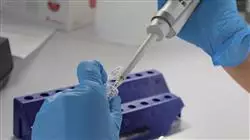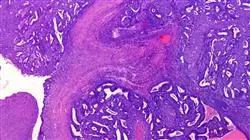University certificate
The world's largest faculty of medicine”
Introduction to the Program
Specialize in the diagnosis and treatment of this type of tumors and reduce the number of deaths from this cause with the help of the best experts"

The concept of cancer of unknown origin encompasses a wide range of situations. In general, it refers to tumors that are diagnosed at a metastatic stage, in which, after a correct diagnostic process, we cannot elucidate the origin of the primary tumor. They represent 3-5% of all tumors diagnosed and are the tenth most common type of tumor in developed countries.
For adults, a cancer is considered rare when its annual incidence is less than 6 cases per 100,000 people. It is estimated that they account for up to 24% of cancers diagnosed in the European Union and about 20% of cancers diagnosed in the United States.
It must be taken into account that this is an area of great research. Therefore, the evolution of molecular diagnostic techniques has made it possible to detect new genomic alterations, which are likely to cause a tumor phenotype, as well as to have greater precision in the detection of those already known. Currently, the diagnostic accuracy achieved with next-generation sequencing (NGS) techniques has made possible a paradigm shift in cancer treatment, opening the door to the choice of treatment based on a particular biomolecular alteration, rather than the type and location of the tumor, a concept known as tumor-agnostic treatment.
In this program, the student is trained to recognize the different entities that make up this group of pathologies: uncommon, rare and ultra-rare cancer; orphan tumors; agnostic tumors; and cancer of unknown origin. This Postgraduate diploma allows the student to approach precision medicine in the context of uncommon tumors, agnostic treatments and cancer of unknown origin, through the resolution of problems by means of different clinical experiences with precision medicine and will be able to apply genomics in the diagnosis and treatment of this type of tumors.
Students will be able to complete the program at their own pace, without being subject to fixed schedules or the travel involved in classroom teaching, so they can combine it with the rest of their daily obligations.
You will know how to apply the knowledge gained to clinical and research problem solving in the area of rare pathology"
This Postgraduate diploma in Orphan, Agnostic Tumors and Tumors of Unknown Origin contains the most complete and up-to-date scientific program on the market. Its most notable features are:
- Case studies presented by experts in oncology
- The graphic, schematic, and practical contents with which they are created, provide scientific and practical information on the disciplines that are essential for professional development
- New developments in the treatment of Orphan, Agnostic Tumors and Tumors of Unknown Origin
- Practical exercises where the self-assessment process can be carried out to improve learning
- Its special emphasis on innovative methodologies in the diagnosis and treatment of Orphan, Agnostic and Tumors of Unknown Origin
- Theoretical lessons, questions to the expert, debate forums on controversial topics, and individual reflection work
- Content that is accessible from any fixed or portable device with an Internet connection
You will develop the judgment necessary to use molecular tools efficiently and safely, which will allow you to detect patients carrying their mutations"
The teaching staff includes professionals from the Oncology sector, who bring their experience to this educational program, as well as renowned specialists from leading societies and prestigious universities.
The multimedia content, developed with the latest educational technology, will provide the professional with situated and contextual learning, i.e., a simulated environment that will provide immersive knowledge programmed to learn in real situations.
This program is designed around Problem-Based Learning, whereby the specialist must try to solve the different professional practice situations that arise throughout the program. For this purpose, the professional will be assisted by an innovative interactive video system created by renowned and experienced experts.
In this TECH program you will delve into the development of numerous agnostic treatments in various pathologies"

You will learn to use molecular tools in the context of this pathology with success and rigor"
Why study at TECH?
TECH is the world’s largest online university. With an impressive catalog of more than 14,000 university programs available in 11 languages, it is positioned as a leader in employability, with a 99% job placement rate. In addition, it relies on an enormous faculty of more than 6,000 professors of the highest international renown.

Study at the world's largest online university and guarantee your professional success. The future starts at TECH”
The world’s best online university according to FORBES
The prestigious Forbes magazine, specialized in business and finance, has highlighted TECH as “the world's best online university” This is what they have recently stated in an article in their digital edition in which they echo the success story of this institution, “thanks to the academic offer it provides, the selection of its teaching staff, and an innovative learning method aimed at educating the professionals of the future”
A revolutionary study method, a cutting-edge faculty and a practical focus: the key to TECH's success.
The most complete study plans on the university scene
TECH offers the most complete study plans on the university scene, with syllabuses that cover fundamental concepts and, at the same time, the main scientific advances in their specific scientific areas. In addition, these programs are continuously being updated to guarantee students the academic vanguard and the most in-demand professional skills. In this way, the university's qualifications provide its graduates with a significant advantage to propel their careers to success.
TECH offers the most comprehensive and intensive study plans on the current university scene.
A world-class teaching staff
TECH's teaching staff is made up of more than 6,000 professors with the highest international recognition. Professors, researchers and top executives of multinational companies, including Isaiah Covington, performance coach of the Boston Celtics; Magda Romanska, principal investigator at Harvard MetaLAB; Ignacio Wistumba, chairman of the department of translational molecular pathology at MD Anderson Cancer Center; and D.W. Pine, creative director of TIME magazine, among others.
Internationally renowned experts, specialized in different branches of Health, Technology, Communication and Business, form part of the TECH faculty.
A unique learning method
TECH is the first university to use Relearning in all its programs. It is the best online learning methodology, accredited with international teaching quality certifications, provided by prestigious educational agencies. In addition, this disruptive educational model is complemented with the “Case Method”, thereby setting up a unique online teaching strategy. Innovative teaching resources are also implemented, including detailed videos, infographics and interactive summaries.
TECH combines Relearning and the Case Method in all its university programs to guarantee excellent theoretical and practical learning, studying whenever and wherever you want.
The world's largest online university
TECH is the world’s largest online university. We are the largest educational institution, with the best and widest online educational catalog, one hundred percent online and covering the vast majority of areas of knowledge. We offer a large selection of our own degrees and accredited online undergraduate and postgraduate degrees. In total, more than 14,000 university degrees, in eleven different languages, make us the largest educational largest in the world.
TECH has the world's most extensive catalog of academic and official programs, available in more than 11 languages.
Google Premier Partner
The American technology giant has awarded TECH the Google Google Premier Partner badge. This award, which is only available to 3% of the world's companies, highlights the efficient, flexible and tailored experience that this university provides to students. The recognition as a Google Premier Partner not only accredits the maximum rigor, performance and investment in TECH's digital infrastructures, but also places this university as one of the world's leading technology companies.
Google has positioned TECH in the top 3% of the world's most important technology companies by awarding it its Google Premier Partner badge.
The official online university of the NBA
TECH is the official online university of the NBA. Thanks to our agreement with the biggest league in basketball, we offer our students exclusive university programs, as well as a wide variety of educational resources focused on the business of the league and other areas of the sports industry. Each program is made up of a uniquely designed syllabus and features exceptional guest hosts: professionals with a distinguished sports background who will offer their expertise on the most relevant topics.
TECH has been selected by the NBA, the world's top basketball league, as its official online university.
The top-rated university by its students
Students have positioned TECH as the world's top-rated university on the main review websites, with a highest rating of 4.9 out of 5, obtained from more than 1,000 reviews. These results consolidate TECH as the benchmark university institution at an international level, reflecting the excellence and positive impact of its educational model.” reflecting the excellence and positive impact of its educational model.”
TECH is the world’s top-rated university by its students.
Leaders in employability
TECH has managed to become the leading university in employability. 99% of its students obtain jobs in the academic field they have studied, within one year of completing any of the university's programs. A similar number achieve immediate career enhancement. All this thanks to a study methodology that bases its effectiveness on the acquisition of practical skills, which are absolutely necessary for professional development.
99% of TECH graduates find a job within a year of completing their studies.
Postgraduate Diploma in Orphan, Agnostic Tumors and Tumors of Unknown Origin
The Postgraduate Diploma in Orphan, Agnostic and Tumors of Unknown Origin is a program designed to provide health professionals with the necessary knowledge to specialize in the study and treatment of cancers of unknown and infrequent origin. The importance of the study of these types of tumors lies in their paradoxically high frequency, since one out of every five tumors diagnosed every day is a rare tumor, as well as having a higher mortality rate compared to frequent cancers. It is necessary to have specialists in these types of pathologies in order to offer more effective treatments and improve the quality of life of affected patients. For this reason, TECH has created this program, which has been developed by professionals of recognized national and international prestige. These professionals have poured their knowledge and experience to provide students with the necessary tools on their way to professional excellence within the most unknown oncology.
Improving the quality of life of your patients with TECH
The mastery of orphan, agnostic and unknown origin tumors is essential for any health professional who wants to provide quality care to their patients. This program is an excellent option for those professionals who wish to specialize in this field and enhance their training in the more obscure oncology.In short, the Postgraduate Diploma in Orphan, Agnostic and Tumors of Unknown Origin is an essential program for healthcare professionals who wish to specialize in the study and treatment of cancers of unknown and infrequent origin. This program is designed to provide students with the necessary knowledge about the epidemiology, diagnosis and treatment of orphan, agnostic and unknown origin tumors, as well as strategies to improve the quality of life of patients. If you wish to specialize in this field and develop your professional career in the most unknown oncology, do not hesitate any longer and train yourself with this very complete program of high academic level.







